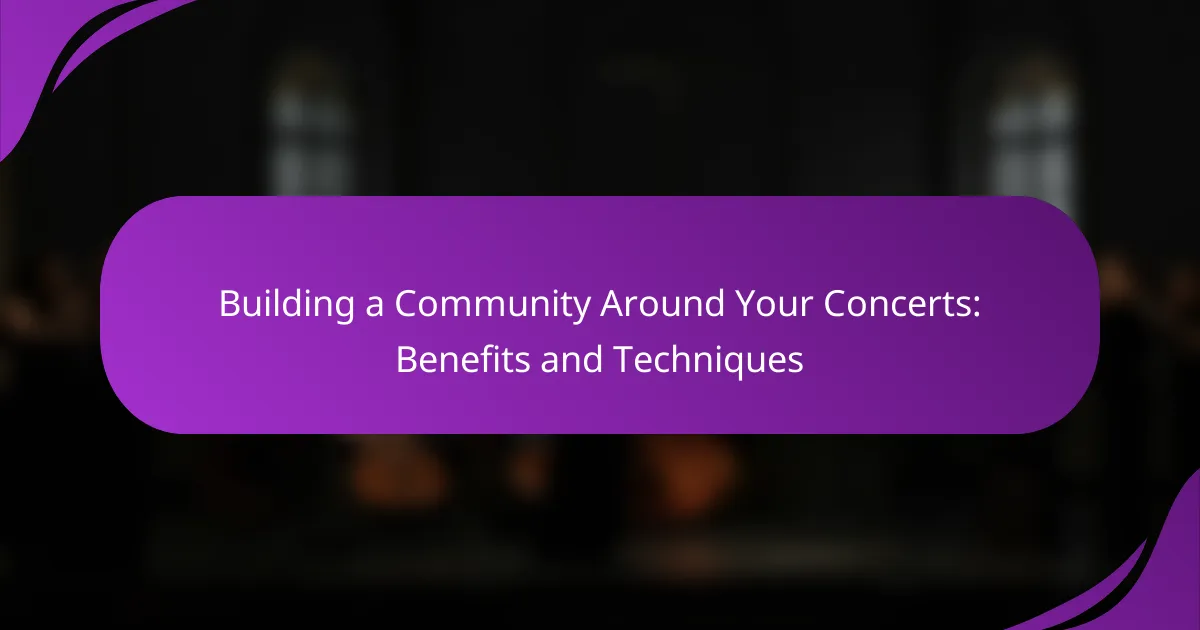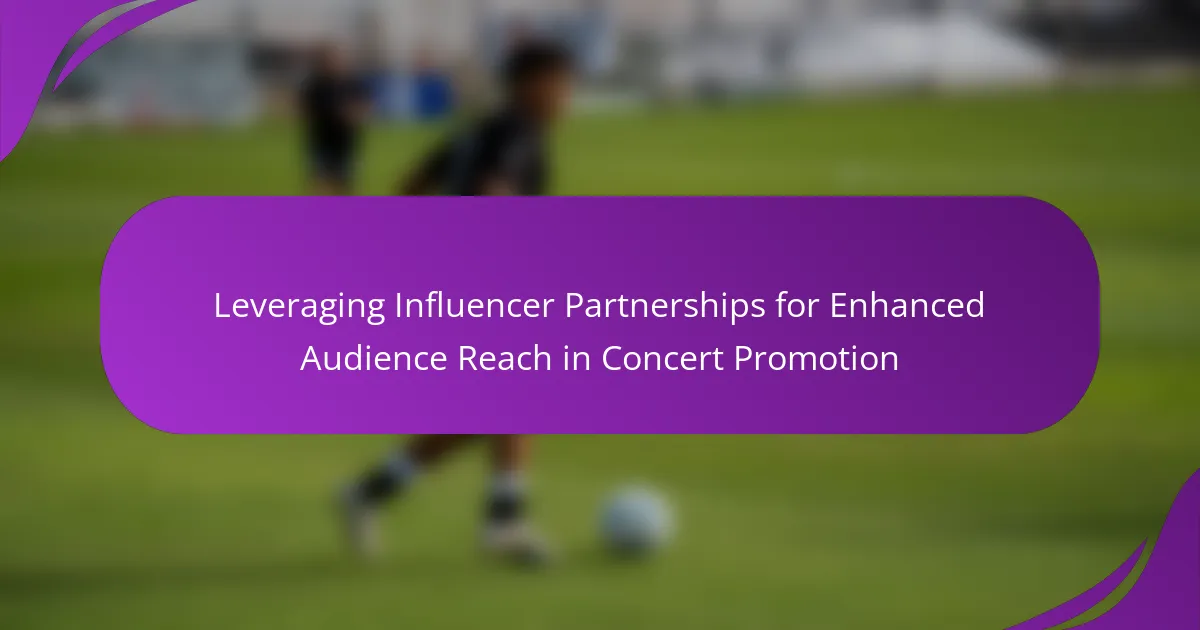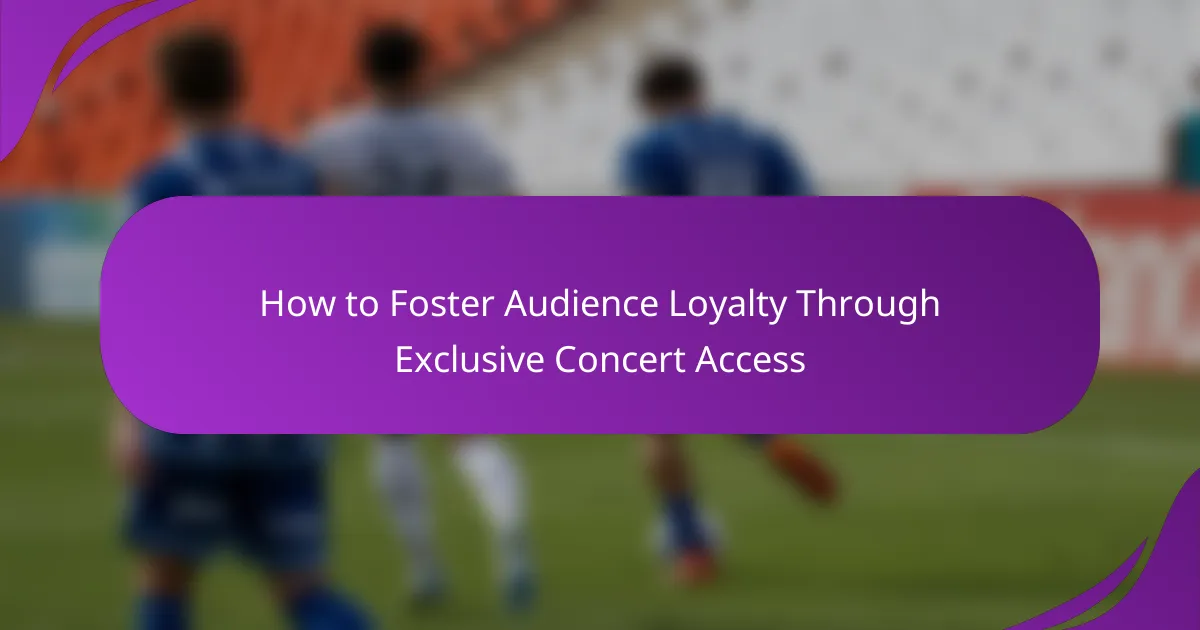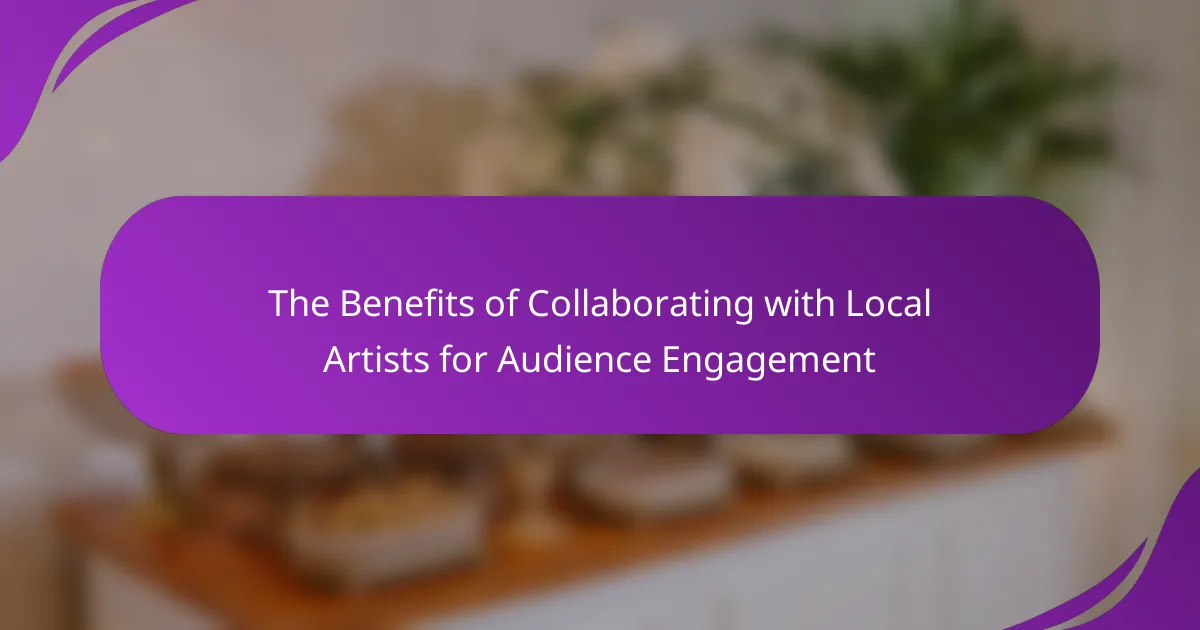Engaging diverse audiences in concert promotion involves understanding cultural differences, implementing inclusive marketing strategies, and fostering community partnerships. Effective concert promotion can be achieved through targeted outreach, accessibility initiatives, and collaboration with local organizations to enhance visibility. Key practices for measuring success include collecting audience feedback, tracking ticket sales across demographics, and analyzing social media engagement. This article outlines strategies for creating a welcoming environment for all concertgoers, emphasizing the importance of representation and accessibility in promoting diverse programming.
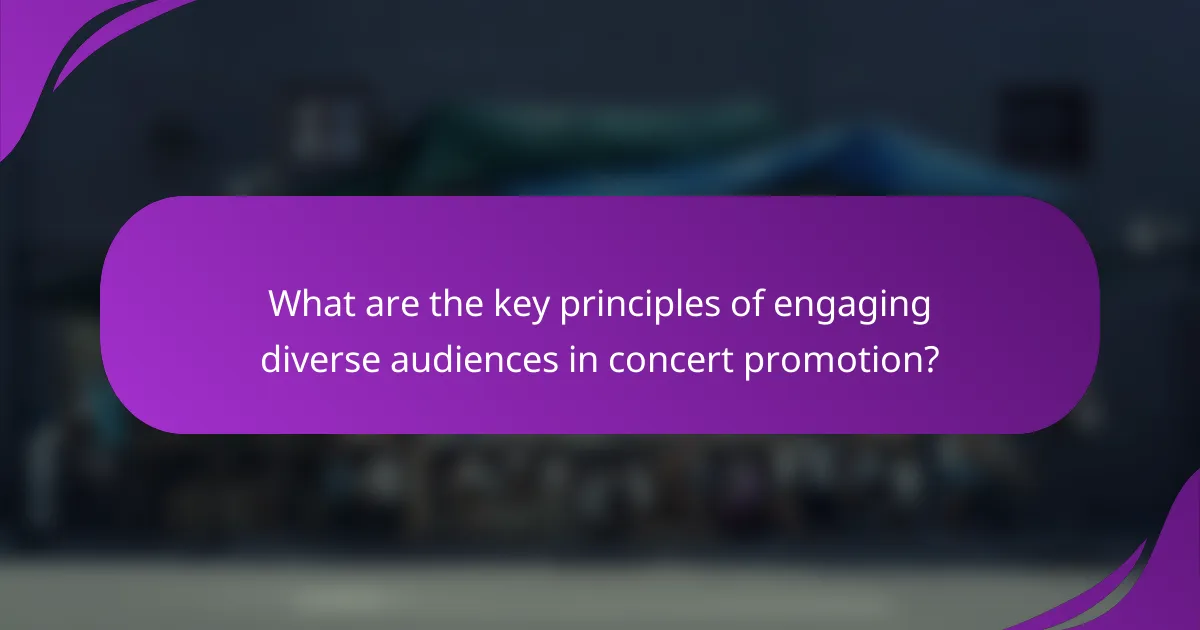
What are the key principles of engaging diverse audiences in concert promotion?
The key principles of engaging diverse audiences in concert promotion include understanding cultural differences, utilizing inclusive marketing strategies, and fostering community partnerships. Understanding cultural differences allows promoters to tailor content and experiences to various demographics. Inclusive marketing strategies ensure that promotional materials reflect the diversity of the audience. Fostering community partnerships helps build trust and encourages participation from underrepresented groups. Research shows that diverse audiences contribute to higher ticket sales and increased brand loyalty. According to a study by the National Endowment for the Arts, diverse programming can attract larger and more varied audiences.
How can understanding cultural differences enhance concert promotion strategies?
Understanding cultural differences enhances concert promotion strategies by allowing marketers to tailor their messaging and outreach. Tailored messaging resonates more effectively with diverse audiences. This can lead to increased ticket sales and engagement. For example, using culturally relevant imagery and language can create a stronger connection with specific demographic groups. Research shows that culturally aware marketing can improve brand perception. A study by the American Marketing Association found that culturally relevant promotions increase consumer trust. Additionally, understanding cultural preferences helps in selecting appropriate venues and artists. This adaptability can significantly widen the audience base and improve overall concert success.
What are the primary cultural factors to consider in audience engagement?
Cultural factors are essential in audience engagement for inclusive concert promotion. These factors include language, traditions, values, and social norms. Language affects communication and accessibility. Traditions influence audience expectations and experiences. Values shape the audience’s preferences and motivations. Social norms dictate acceptable behaviors within cultural groups. Understanding these factors enhances connection and relevance. For example, incorporating local languages can increase audience relatability. Recognizing traditions can foster a sense of belonging. Tailoring content to align with values can improve engagement outcomes.
How do these cultural factors influence concert attendance and participation?
Cultural factors significantly influence concert attendance and participation. They shape individuals’ perceptions of music genres and events. Cultural background affects preferences for specific artists and styles. Community values can enhance social connections at concerts. Festivals that celebrate cultural heritage often see higher attendance. Research indicates that diverse programming attracts varied audiences. For instance, events featuring multicultural lineups promote inclusivity. Cultural relevance increases audience engagement and participation. Understanding these factors helps in designing effective promotional strategies.
What role does accessibility play in inclusive concert promotion?
Accessibility is crucial in inclusive concert promotion as it ensures that all individuals can attend and enjoy the event. This includes physical access, such as wheelchair ramps, and sensory accommodations, like sign language interpreters. Concert promoters must consider the diverse needs of their audience. Research shows that 1 in 4 adults in the U.S. have a disability, highlighting the importance of accessibility in reaching a larger audience. By implementing accessible features, promoters can enhance the experience for everyone and foster a more inclusive environment. This approach not only meets legal requirements but also demonstrates a commitment to diversity and community engagement.
How can concert venues improve accessibility for diverse audiences?
Concert venues can improve accessibility for diverse audiences by implementing various strategies. These include installing ramps and elevators for wheelchair users. Providing designated seating areas for individuals with mobility challenges is essential. Venues should also offer assistive listening devices for those with hearing impairments. Clear signage in multiple languages can help non-native speakers navigate the venue. Staff training on accessibility issues enhances customer service for all attendees. Additionally, offering sensory-friendly events caters to individuals with sensory sensitivities. According to the Americans with Disabilities Act, venues must comply with accessibility standards to ensure inclusivity. These measures collectively create a more welcoming environment for everyone.
What specific accommodations should be made for individuals with disabilities?
Specific accommodations for individuals with disabilities include accessible venues, sign language interpreters, and assistive listening devices. Venues should have wheelchair ramps and accessible restrooms. Seating arrangements must allow for companion seating. Clear signage in large print or braille is essential. Events should provide sensory-friendly spaces for individuals with sensory sensitivities. Transportation services should be made available for those with mobility challenges. These accommodations ensure equal access and participation in concert events.
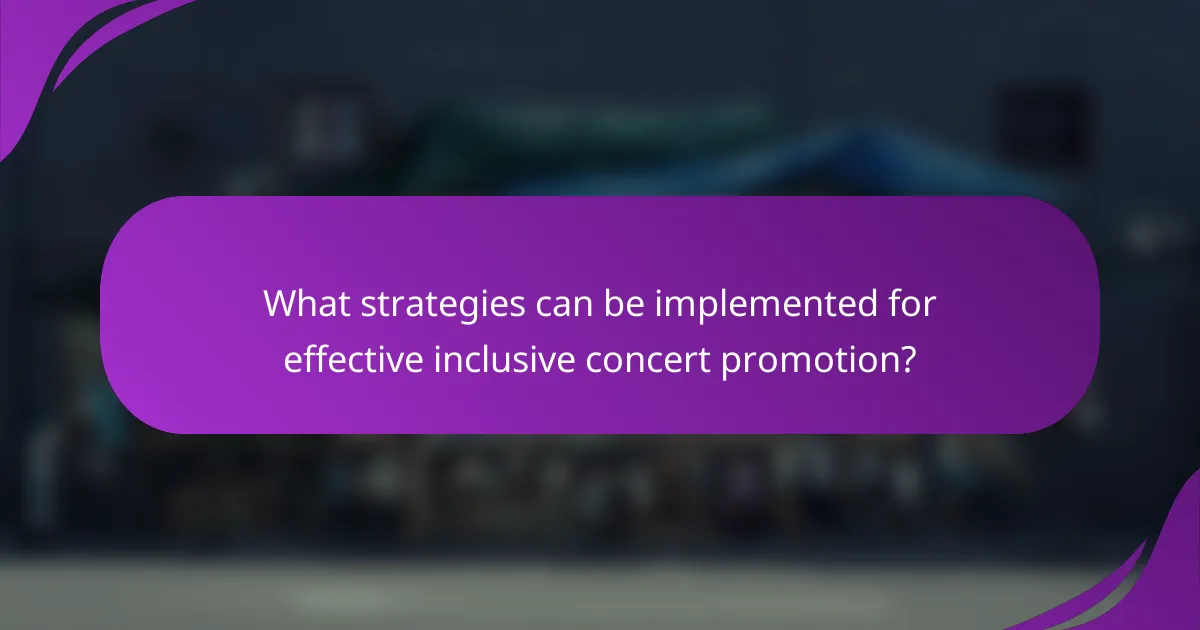
What strategies can be implemented for effective inclusive concert promotion?
Effective inclusive concert promotion can be achieved through targeted outreach and accessibility initiatives. Utilizing diverse marketing channels ensures that various communities are reached. Collaborating with local organizations can enhance visibility and trust within specific demographics. Offering affordable ticket pricing and flexible payment options makes events accessible to a wider audience. Implementing accessibility features, such as sign language interpreters and wheelchair access, ensures that everyone can participate. Engaging with community feedback helps tailor events to meet the needs of diverse groups. Promoting a diverse lineup of artists fosters inclusivity and representation. These strategies collectively create a welcoming environment for all concertgoers.
How can social media be leveraged to reach diverse audiences?
Social media can be leveraged to reach diverse audiences by utilizing targeted content and inclusive messaging. Platforms like Facebook, Instagram, and Twitter allow for demographic targeting based on interests, location, and behaviors. This targeting ensures that messages resonate with specific cultural and social groups. Engaging visuals and language that reflect the diversity of the audience can enhance relatability. Moreover, collaborating with influencers from various backgrounds can amplify outreach and credibility. Research shows that 70% of consumers are influenced by social media when making purchasing decisions. Therefore, creating a diverse content strategy can significantly increase engagement and attendance.
What types of content resonate most with varied audience segments?
Diverse audience segments resonate with personalized and relatable content. This includes stories that reflect their experiences and values. Visual content, such as videos and infographics, often captures attention effectively. Interactive formats, like polls and quizzes, engage audiences by inviting participation. Educational content that provides valuable insights can also attract interest. Data shows that 70% of consumers prefer content tailored to their interests. Additionally, user-generated content fosters community and connection among audience members. Brands that utilize these content types can enhance engagement and loyalty.
How can targeted advertising improve engagement with underrepresented groups?
Targeted advertising can improve engagement with underrepresented groups by delivering tailored messages that resonate with their unique experiences and needs. This approach allows brands to connect on a personal level, fostering a sense of inclusion. Research shows that targeted ads increase relevance, which can lead to higher click-through rates. For example, a study by the American Marketing Association found that personalized marketing can boost engagement by up to 20%. Additionally, targeted advertising can highlight cultural events and community-specific promotions, making the content more appealing. This strategy not only enhances brand loyalty but also encourages participation from diverse audiences in concert promotions.
What partnerships can enhance inclusivity in concert promotion?
Collaborations with local community organizations can enhance inclusivity in concert promotion. These partnerships provide access to diverse audiences. Organizations focused on cultural outreach can help promote events to underrepresented groups. Collaborating with disability advocacy groups ensures accessibility for individuals with disabilities. Partnering with educational institutions can engage younger audiences and foster inclusivity. Additionally, alliances with local artists can promote cultural representation in lineups. Statistics show that diverse lineups attract wider audiences and increase ticket sales. Research indicates that inclusive practices lead to higher community engagement and satisfaction.
How can collaboration with local community organizations benefit concert outreach?
Collaboration with local community organizations can significantly enhance concert outreach. These organizations often have established relationships within the community. They can help identify and engage diverse audience segments. Local organizations also provide insights into cultural preferences and interests. This information can guide concert programming to align with community values. Additionally, they can assist in promoting events through trusted channels. This increases visibility and attendance. Studies show that community-based partnerships lead to higher engagement rates. For instance, events that collaborate with local groups often see a 30% increase in attendance compared to those that do not.
What role do influencers play in promoting inclusivity in events?
Influencers play a crucial role in promoting inclusivity in events. They leverage their platforms to raise awareness about diverse representation. Influencers can highlight marginalized voices and communities. They often collaborate with event organizers to ensure diverse lineups. Their reach helps attract a broader audience, enhancing participation. Studies show that events featuring diverse talent see increased attendance. Influencers also encourage brands to adopt inclusive practices. Their advocacy can lead to more equitable opportunities in the industry.
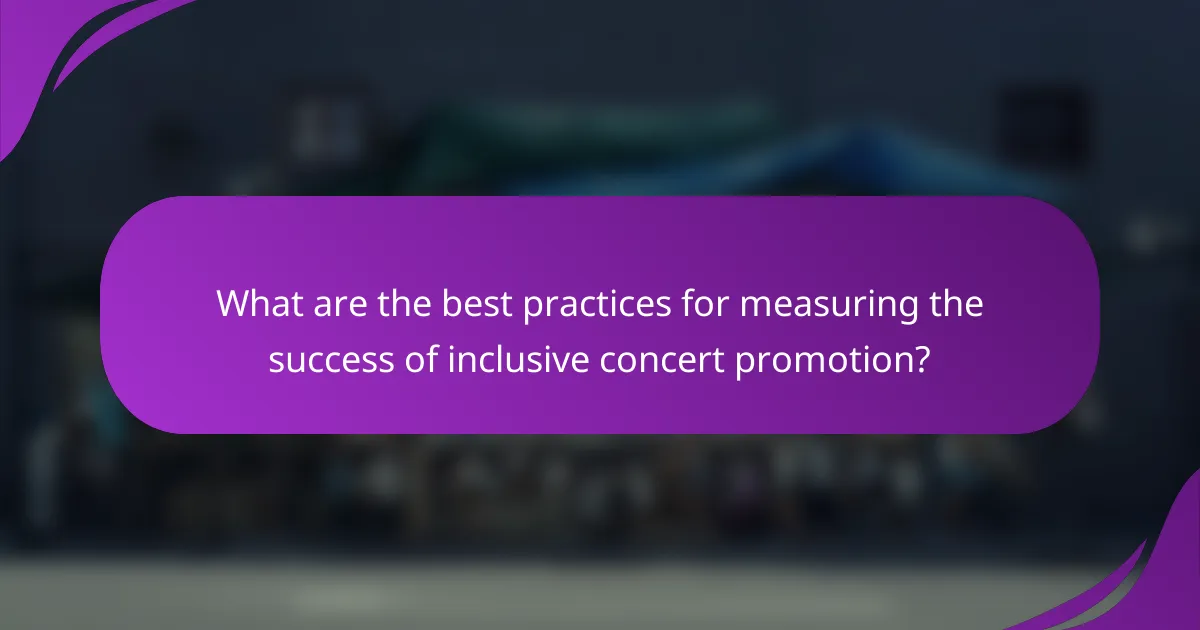
What are the best practices for measuring the success of inclusive concert promotion?
The best practices for measuring the success of inclusive concert promotion include collecting diverse audience feedback. Surveys can gauge attendee satisfaction and identify areas for improvement. Tracking ticket sales across various demographics provides insights into audience reach. Analyzing social media engagement helps assess promotional effectiveness. Collaboration with community organizations can enhance outreach and measure impact. Monitoring accessibility features ensures all attendees can participate fully. Evaluating post-event discussions and media coverage can highlight public perception. Finally, establishing clear goals at the outset allows for measurable outcomes and comparisons.
How can feedback from diverse audiences be effectively gathered?
Feedback from diverse audiences can be effectively gathered through multiple channels. Surveys and questionnaires can reach a wide audience quickly. Online platforms allow for anonymous responses, encouraging honesty. Focus groups can provide in-depth insights from specific demographics. Social media engagement invites real-time feedback and interaction. Community forums foster open discussions and diverse opinions. Utilizing multiple languages ensures inclusivity in communication. Analyzing attendance data reveals trends and preferences among different audience segments. These methods have been shown to enhance understanding of audience needs and improve engagement strategies.
What tools can be used to analyze audience demographics and engagement?
Google Analytics provides insights into audience demographics and engagement metrics. This tool tracks user behavior on websites and applications. It offers data on age, gender, location, and interests. Facebook Insights analyzes engagement on Facebook pages. It provides demographic information about followers and their interactions. Twitter Analytics offers similar insights for Twitter accounts. It shows audience demographics and engagement rates for tweets. Other tools include Sprout Social and Hootsuite. These platforms aggregate data from various social media channels. They provide comprehensive reports on audience demographics and engagement. Using these tools helps organizations tailor their marketing strategies effectively.
How can data-driven insights inform future concert promotion strategies?
Data-driven insights can significantly enhance future concert promotion strategies. They enable promoters to understand audience preferences and behaviors. By analyzing ticket sales data, promoters can identify which genres attract specific demographics. This information allows for targeted marketing campaigns. Social media analytics provide insights into audience engagement levels. Promoters can adjust their promotional tactics based on real-time feedback. Historical data can reveal trends in concert attendance over time. This helps in planning future events more effectively. Ultimately, leveraging data leads to more successful and inclusive concert promotions.
What common challenges arise in engaging diverse audiences for concerts?
Engaging diverse audiences for concerts presents several common challenges. One challenge is cultural differences in music preferences. Different communities may have varying tastes that influence attendance. Another challenge is accessibility. Physical and financial barriers can prevent participation from certain groups. Language barriers also complicate communication and marketing efforts. Additionally, there may be a lack of representation in promotional materials. This can lead to feelings of exclusion among diverse groups. Scheduling conflicts with community events can further hinder attendance. Lastly, misconceptions about the concert’s genre or atmosphere can deter potential attendees. These factors collectively impact the ability to engage a wide audience effectively.
How can these challenges be addressed to improve future promotions?
To address challenges in promoting inclusive concerts, implementing targeted outreach strategies is essential. Engaging with diverse communities can enhance participation. Collaborating with local organizations can create trust and awareness. Utilizing social media platforms tailored to specific demographics increases visibility. Offering varied ticket pricing can make events more accessible. Gathering feedback from underrepresented groups can inform future promotions. These strategies have been shown to increase attendance and satisfaction in diverse audiences. For example, a study by the National Endowment for the Arts found that inclusive marketing significantly boosts event participation among marginalized groups.
What practical tips can be applied for successful inclusive concert promotion?
Successful inclusive concert promotion requires intentional strategies to engage diverse audiences. Start by ensuring accessibility for all attendees. This includes physical access to the venue, as well as accommodations for individuals with disabilities. Utilize various marketing channels to reach different communities. Social media platforms, local community boards, and partnerships with diverse organizations can enhance visibility.
Incorporate diverse artists and genres in the lineup. This representation can attract a wider audience and foster inclusivity. Provide materials in multiple languages if necessary, catering to non-English speakers. Engage with community leaders to understand specific needs and preferences. Collect feedback from attendees after the event to improve future promotions. These steps can significantly enhance the inclusivity of concert promotions and ensure a welcoming environment for everyone.
Engaging Diverse Audiences is the primary entity of this article, which focuses on strategies for inclusive concert promotion. The article outlines key principles such as understanding cultural differences, implementing inclusive marketing strategies, and enhancing accessibility to engage various demographics effectively. It discusses the importance of community partnerships, targeted advertising, and the role of social media in reaching underrepresented groups. Additionally, it addresses common challenges in promoting inclusivity and provides practical tips for improving audience engagement through feedback and data-driven insights.
